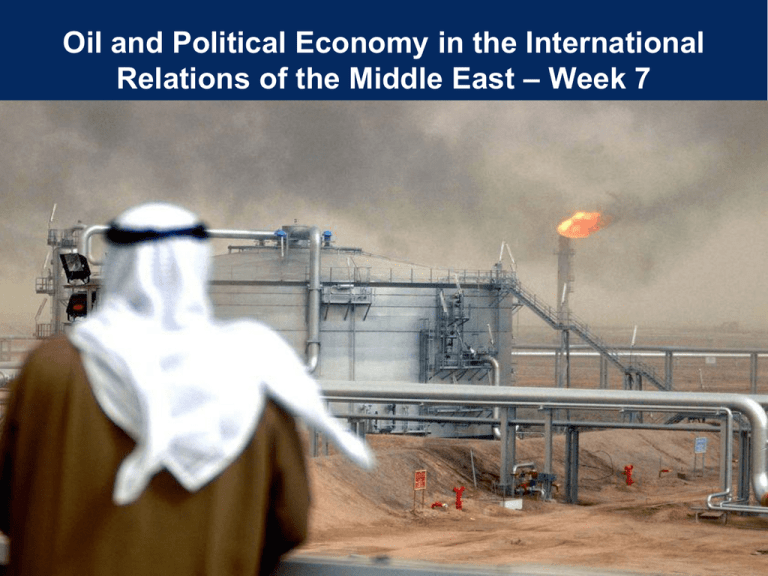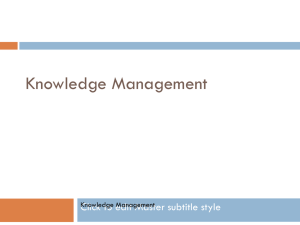Book title, edition number – edit on master slide
advertisement

Oil and Political Economy in the International Relations of the Middle East – Week 7 Author/s: Book title, edition number – edit on master slide Author/s: Book title, edition number – edit on master slide Author/s: Book title, edition number – edit on master slide Author/s: Book title, edition number – edit on master slide Author/s: Book title, edition number – edit on master slide Author/s: Book title, edition number – edit on master slide Author/s: Book title, edition number – edit on master slide Author/s: Book title, edition number – edit on master slide Iraq Author/s: Book title, edition number – edit on master slide Author/s: Book title, edition number – edit on master slide Author/s: Book title, edition number – edit on master slide Author/s: Book title, edition number – edit on master slide Author/s: Book title, edition number – edit on master slide Author/s: Book title, edition number – edit on master slide Author/s: Book title, edition number – edit on master slide Author/s: Book title, edition number – edit on master slide Short History of ME Oil Politics 25th May, 1908 Oil was discovered in Persia by the Anglo-Persian Oil Discovered in oil company.Discovery of oil in 1908 in Iran was a Iran turning point in the future of the Middle East. 11th Nov, 1918 WWI Ends and the Middle East Becomes the World's Supplier The US decided to enter the oil game in the Middle East. The British government allowed the United States to begin drilling in Iraq and other countries near the Persian Gulf 1918 The Ottoman Empire is Defeated Britain and France. The Middle East was split between Britain and France. Britain gained control of the resources in the Middle East. Author/s: Book title, edition number – edit on master slide Author/s: Book title, edition number – edit on master slide Author/s: Book title, edition number – edit on master slide The Redline Agreement (1928) • A consortium of 7 companies ( known as 7 sisters), 5 of which are American, is given financial interst in Iraq Petroleum Company, and the companies agree to not indepedently develop oil in an area that spans form Turkey to Iraq and Saudi Arabia. • Its ‘self-denial clause’ allows seven companies to control the bulk of Mideast oil production by the early 1930s. Author/s: Book title, edition number – edit on master slide The Red Line Agreement (1928) -2 Author/s: Book title, edition number – edit on master slide Seven Sisters Author/s: Book title, edition number – edit on master slide Developing US-Saudi Arabia Relations (1943-45) • In 1938, SA is found vast quatities of oil. • In 1943, with concerns growing about diminishing US oil production capacity, President Roosevelt decleares Saudi Oil vital to US security and provides financial support. • A few years later, the world’s biggest oil fields is found in SA, and it quickly becomes the world’s largest exporter of oil – though not a significant US supplier for several decades. Author/s: Book title, edition number – edit on master slide President Roosevelt and King Abdul Aziz Ibn Saud ( Feb.1945) Author/s: Book title, edition number – edit on master slide US- Iran Oil Consortium (1954) • In August 1953, the Iranian military, with the help of British/US intelligence agencies, overthrows Iranian Prime Minister Mohammed Mossadeq – who nationalized the country’s oil industry. • In October 1954, the Iranian government led by the Shah agrees to a consortium of mainly US companies to manage Iran’s oil industy. Author/s: Book title, edition number – edit on master slide Author/s: Book title, edition number – edit on master slide The Suez Canal Crisis (1956-7) • In July 1956, Egypt nationalizes the Suez Canal, which has been controlled by Britain and France. • In a coordinated attack with Israel temporarly seize the canal in October. • Half of the canal’s traffic is petroleum, and the ensuring crisis from its closure threatens Middle East oil shipments, which supply about 800,000 barrels a day to Europe. • Eisenhower compels a withdrawal to avoid confrontation with the SU. Author/s: Book title, edition number – edit on master slide 1st Jan, 1945 The Need for Oil Increases After WWII, the need for oil .Until then the Middle East was only producing about 5% of the world’s oil. American companies going into the oil industry in the Middle East made the industry what it is today. 10th Sep, 1960 Organization of the Petroleum Exporting Countries (OPEC) is formed In 1960, OPEC was created. These countries were moving toward nationalism in the oil industry. OPEC is Formed: Continued OPEC was to protect the oil resources and how the country gained revenue from them with foreign companies having so much control. OPEC is still a monumental part of regulating oil and making sure it is fair for all those involved today. 10th Sep, 1960 1st OPEC Conference, Baghdad, September 10–14, 1960 Author/s: Book title, edition number – edit on master slide First Arab Oil Embargo • On June 6,1967,Israel enters into an armed conflict with Eqypt,Syria,and Jordan,known as the Six Day War. • In return, Arab oil ministers call for an embargo on countries friendly to Israel. • US production surges and largely offsets the teporary loss of Mideast oil globally. • By September, the embargo is lifted. Author/s: Book title, edition number – edit on master slide Oil Crisis (October 1973) • On October 6, Syria and Egypt attack Israel. • On October 19,the Nixon administration announces military aid package to Israel. • In return, Arab states suspends oil exports to Israeli allies, reducing traded oil supplies by 14% internationally and skyrocketing oil prices. Author/s: Book title, edition number – edit on master slide Iranian Revolution (1978-79) • In October 1978, thousands of oil workers go on strike in Iran, as part of a cycle of unrest protesting the Shah. • Doping in Iranian oil output, 5% loss in global production. • As a response to the hostage crisis, Pr.Carter ordered severing diplomatic relations and embargoing Iranian oil imports. • Between January 1979-Dec. 1979,global oil prices more than double. Author/s: Book title, edition number – edit on master slide Author/s: Book title, edition number – edit on master slide Carter Doctrine (1980) “ An attempt by any outside force to gain control of the Persian Gulf region will be regarded as an assault on the vital interests of the United States of America, and such an assault will be repelled by any means necessary, including military force ” Author/s: Book title, edition number – edit on master slide Iran-Iraq War (1980-88) • Continuing attacks on both Iraqi and Iranian oil facilities remove 4 million barrels a day in oil production from global production. • Regan’s national security directive in 1983 to increase the US military presence in the Persian Gulf to protect the oil facilities and shipments to allies. Author/s: Book title, edition number – edit on master slide Iraq’s Invasion of Kuwait (1990-1) • Iraq invades Kuwait on August 2,1990, following a dispute over the Rumaila oil field on the border. • In response, Bush says Iraq’s aggression poses an economic threat to the US ,declares the ‘sovereign independence’ of SA a vital interest’ and deploys troops to the country. Author/s: Book title, edition number – edit on master slide Libya Rocks Oil Markets • In February 2011,Libya becmoes the first major oil-producing nation ( 2% global oil output) to join Arab uprisings. • Though the country does not supply oil to the US, concerns grow that the situation in Libya and potentila unrest in other oil-producing nation could lead to a new global oil crisis. • In a March 30 speech, Obama says: ‘ We will keep on being a victim to shifts in the oil market we get serious about a long-term policy for secure, affordable energy.’ Author/s: Book title, edition number – edit on master slide Author/s: Book title, edition number – edit on master slide Oil and the Consolidation of the State System • Strategic interest in oil since early 20th century, e.g. British policy in the Gulf. • Fundamental influence in shaping boundaries and independent existence of many states in the region. • Instrumental in consolidation by favouring aggregation around the oil sector. • Oil is a supporting cause to violence, but not a primary one. Author/s: Book title, edition number – edit on master slide Oil and the International Relations of the Middle East • Impact of oil on relations between countries of the region as well as relations with the rest of the world. • British, and later American, attitudes towards the Middle East strongly influenced by oil. • Oil as a tool, rather than an objective: sanctions against Libya, Iraq, Iran make access more difficult in order to pursue political goals. • For producers, oil is not a prominent issue in shaping foreign policy , but their ‘ regime security’ is . Author/s: Book title, edition number – edit on master slide Author/s: Book title, edition number – edit on master slide Oil and Domestic Politics: The Rentier State Paradigm • Oil rents (i.e.petrodollars) are paid directly to the state from abroad, which in turn supports society by allocating this rent. • Production (taxes coming from society) vs Allocation. • Not all Arab states are rentier. • Implications of rentierism for state: no need to seek legitimacy through democratic representation, and autonomy in policies. • Challenge of establishing representative democracy in a rentier state prospects for Arab Spring? Author/s: Book title, edition number – edit on master slide Oil and Inter-Arab Relations • Dialectic between oil-poor and oil-rich states in the region. • Authoritarian rentier states do not need a “national myth”. • Oil-poor state claims to share of rent. • 1970s rent boom led to period of international redistribution. • Balance of power has shifted to the newer, oil rich states such as the countries of the GCC Author/s: Book title, edition number – edit on master slide Author/s: Book title, edition number – edit on master slide Author/s: Book title, edition number – edit on master slide Author/s: Book title, edition number – edit on master slide Author/s: Book title, edition number – edit on master slide Regional/International Environments and Political Order • Being an oil producer seems to help against uprisings. • Arab Spring’s challenge to Gulf countries: divided responses. • Outcome of ‘revolutions’ will determine impact: pressure for democracy in the Gulf, or business as usual? Author/s: Book title, edition number – edit on master slide Author/s: Book title, edition number – edit on master slide Author/s: Book title, edition number – edit on master slide Author/s: Book title, edition number – edit on master slide Conclusion • Middle East plays a central role in international oil. • Debate over whether oil is a political commodity. • Apart from rents, control of oil has not brought special political or military benefits. • Polarisation between oil-haves and oil-havenots Author/s: Book title, edition number – edit on master slide Author/s: Book title, edition number – edit on master slide









